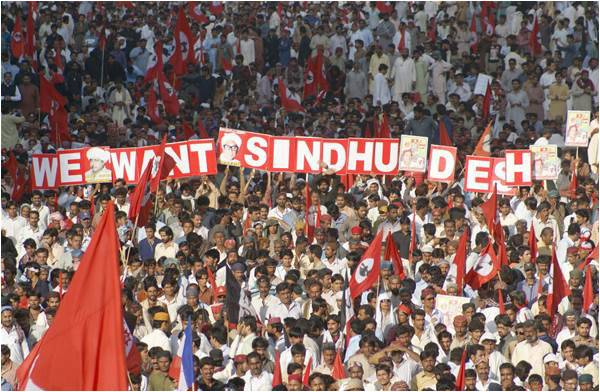
“I am speaking to you as you stand before burnt corpses of two brave sons of Sindh, whose only sin was that they loved their motherland,” Sanan Qureshi told an emotionally charged crowd of thousands on Karachi’s MA Jinnah Road on March 23. The demonstrators had gathered for a ‘freedom march’ organized by Sindhi nationalist group Jeay Sindh Qaumi Mahaz (JSQM). Two days before the rally, two central leaders of the party were killed. “And these bodies are asking of the international community and human rights bodies – is it a crime to love your motherland?”
Maqsud Qureshi and Suleman Wadho were found dead inside their burning car early on March 21, outside Bhirya city in Naushero Feroz disctrict. A post mortem report revealed that they had both been shot dead before their bodies were burned.
The JSQM leadership saw it as a warning, but did not call off the march. Instead, they put the dead bodies in a morgue and took them along for the rally.
[quote]They were both shot dead before their bodies were burned[/quote]
Sanan Qureshi is a nephew of Maqsud Qureshi, who was the son of the charismatic JSQM ex-chairman Bashir Qureshi, who had also died under mysterious circumstances the on April 6 2012.
The caravan, made of thousands of vehicles, carried the corpses to Tibet center about 25 kilometers away in a spectacular show of strength. But the rally took less than an hour. There was only one speech, by Sanan. They said funeral prayers and left for Ratodero, a small town in northern Sindh where Maqsud and Suleman were buried the next day, besides the grave of Bashir Qureshi.
JSQM is among a dozen small Sindhi nationalist political parties who follow the ideology of GM Sayed. Sayed was among the few politicians who were at the forefront in shaping the 1940 Pakistan Resolution and the subsequent Sindh Assembly resolution in favor of Pakistan. He advocated provincial autonomy within the federation of Pakistan until 1971, when the country broke up. In 1972, he proposed the independence of Sindh. JSQM openly advocates the idea.
The party announced its first ‘freedom march’ in 2010, but it was in 2013 that it made waves. The gathering was among the largest by any Sindh-based political group in Karachi. Bashir Qureshi began to get warnings and threats soon after. Two weeks later, he complained of sudden stomach pain while he was staying overnight at a friend’s place in the Sakrand town en route to Karachi. By the time he was taken to hospital, he had died.
Maqsud, a shy, humble young man, took over the party leadership reluctantly. He had kept himself away from political limelight when his brother was alive. Maqsud was on his way from Larkana to Karachi late on March 19 after a tour related to the march, when he was last seen in Mehar city at 9pm. He disappeared the next morning, only to be found dead two days later.
There were condemnations from several quarters. The MQM, which had opposed the 2012 freedom march, decided to join this year’s rally. But there was little coverage of the event on the national media.
Writer is editor of Affair, a Sindhi news
magazine
Twitter: @alirind
Maqsud Qureshi and Suleman Wadho were found dead inside their burning car early on March 21, outside Bhirya city in Naushero Feroz disctrict. A post mortem report revealed that they had both been shot dead before their bodies were burned.
The JSQM leadership saw it as a warning, but did not call off the march. Instead, they put the dead bodies in a morgue and took them along for the rally.
[quote]They were both shot dead before their bodies were burned[/quote]
Sanan Qureshi is a nephew of Maqsud Qureshi, who was the son of the charismatic JSQM ex-chairman Bashir Qureshi, who had also died under mysterious circumstances the on April 6 2012.
The caravan, made of thousands of vehicles, carried the corpses to Tibet center about 25 kilometers away in a spectacular show of strength. But the rally took less than an hour. There was only one speech, by Sanan. They said funeral prayers and left for Ratodero, a small town in northern Sindh where Maqsud and Suleman were buried the next day, besides the grave of Bashir Qureshi.
JSQM is among a dozen small Sindhi nationalist political parties who follow the ideology of GM Sayed. Sayed was among the few politicians who were at the forefront in shaping the 1940 Pakistan Resolution and the subsequent Sindh Assembly resolution in favor of Pakistan. He advocated provincial autonomy within the federation of Pakistan until 1971, when the country broke up. In 1972, he proposed the independence of Sindh. JSQM openly advocates the idea.
The party announced its first ‘freedom march’ in 2010, but it was in 2013 that it made waves. The gathering was among the largest by any Sindh-based political group in Karachi. Bashir Qureshi began to get warnings and threats soon after. Two weeks later, he complained of sudden stomach pain while he was staying overnight at a friend’s place in the Sakrand town en route to Karachi. By the time he was taken to hospital, he had died.
Maqsud, a shy, humble young man, took over the party leadership reluctantly. He had kept himself away from political limelight when his brother was alive. Maqsud was on his way from Larkana to Karachi late on March 19 after a tour related to the march, when he was last seen in Mehar city at 9pm. He disappeared the next morning, only to be found dead two days later.
There were condemnations from several quarters. The MQM, which had opposed the 2012 freedom march, decided to join this year’s rally. But there was little coverage of the event on the national media.
Writer is editor of Affair, a Sindhi news
magazine
Twitter: @alirind

